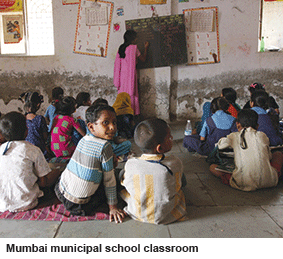 Maharashtra’s BJP-Shiv Sena government has introduced a new school certification system applicable to all primary and secondary schools statewide, irrespective of board affiliation. The ‘Samruddha Shala’ system will evaluate a school’s compliance with the norms and standards mandated by s.19 and Schedule of the Right of Children to Free and Compulsory Education (RTE) Act, 2009.
Maharashtra’s BJP-Shiv Sena government has introduced a new school certification system applicable to all primary and secondary schools statewide, irrespective of board affiliation. The ‘Samruddha Shala’ system will evaluate a school’s compliance with the norms and standards mandated by s.19 and Schedule of the Right of Children to Free and Compulsory Education (RTE) Act, 2009.
The new infrastructure assessment system is modelled on a Central government initiative — ‘Shala Siddhi’ or National Programme of School Standards and Evaluation — devised by the Delhi-based National University of Educational Planning and Administration (NUEPA) under the aegis of the Union HRD ministry in December 2015. Since then, state governments countrywide have launched their versions under the Shala Siddhi guidelines.
In Maharashtra, schools applying for the Samruddha Shala (SS) certificate are obliged to evaluate themselves before being assessed by an external assessor from the Maharashtra State Council of Education, Research & Training (MSCERT). In addition to a s.19 norms compliance report, every school has to also send a self-evaluation report assessing its learning attainments, students’ progress, teacher performance, school leadership, productive community participation and adherence to health and safety standards.
Under s.19 of the RTE Act, all schools have to ensure they are equipped with infrastructure facilities such as well-equipped classrooms, drinking water, clean toilets, a library, playground, ramps for differently abled students, a boundary wall etc. The Act gave all private schools a three-year time window to become compliant with the norms and standards specified in s.19 and the Schedule after the Act became law on April 1, 2010.
Although typically, government schools are exempt from the stringent financial penalties including forcible closure stipulated in s.19, the norms and standards specified are as applicable to government schools as to private. But despite the great majority of 67,691 government primaries in Maharashtra being non-compliant with s.19, education ministry officials seem to derive considerable comfort from data which indicates that 22,019 of them are RTE-compliant.
However, according to Status of RTE Implementation in the State, a report published by the Mumbai-based NGO Samarthan earlier this year, a large number of primary schools in Maharashtra (pop.112 million) — India’s most industrialised state — lack basic infrastructure facilities. According to the report, 13,106 schools don’t have electricity, 970 don’t have separate toilets for girls, and 388 schools don’t provide children drinking water. Moreover according to Samarthan, the classrooms of 25,585 schools are in poor condition and pose a danger to children in them.
At least one teacher per classroom and a 1:40 teacher-pupil ratio is one of the norms specified in the Schedule of the RTE Act. However in 2014-15, the number of teacher vacancies in Maharashtra’s primary schools rose to 30,000 barely averaging one teacher per class.
“A sum of Rs.230 crore earmarked for zilla parishads and Rs.22 crore for municipal corporations under the Sarva Shiksha Abhiyan (SSA) programme remained unspent in fiscal 2015-16. For instance, a proposal to construct girls’ hostels to reduce the dropout percentage of secondary school girls and protective walls for all government girls’ hostels at a total cost of Rs.137.5 crore, remained a non-starter. Education projects under SSA are being stalled, not for want of funds but for want of political will,” says Rupesh Kir, co-ordinator and author of the Samarthan report.
Instead of mandating elaborate reporting systems for private schools, the state government’s education ministry needs to set a good example by managing its own schools with at least minimal efficiency.
Dipta Joshi (Mumbai)























